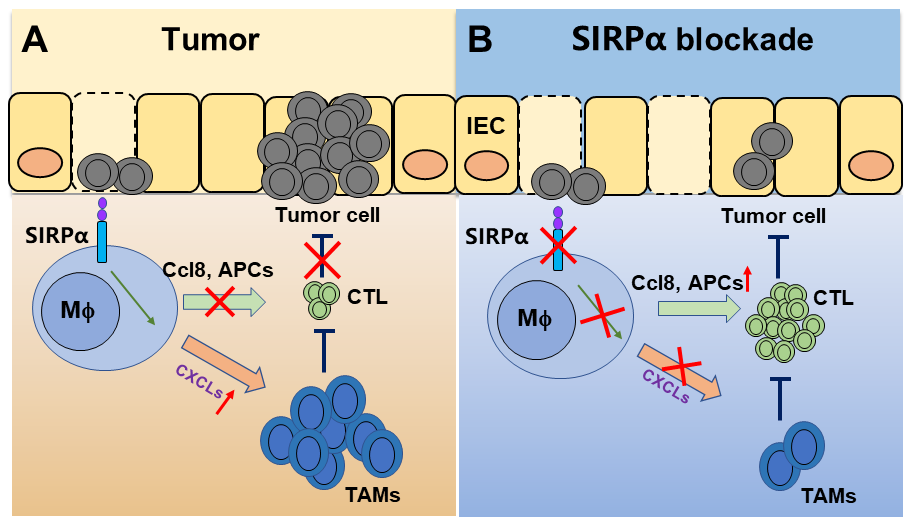Malignant tumors are one of the leading diseases causing death. Immunotherapy, such as PD-1/PD-L1 inhibitors, reactivates the patient’s immune system to fight tumors by relieving the exhausted T cells. However, immunosuppressive myeloid cells in the tumor immune microenvironment (TIME) constrain T cell activity and hinder immunotherapeutic efficacy, but the precise mechanisms remain undefined.

Associate Professor Wenfei Jin from the School of Life Sciences at the Southern University of Science and Technology (SUSTech) led a research group that discovered alternative antitumor signaling of Sirpa, where Sirpa deficiency recruits T cells into the tumor via Syk/Btk-dependent Ccl8 secretion.
Their research results were published in the high-impact academic journal Nature Cancer, entitled “Sirpα on tumor-associated myeloid cells restrains anti-tumor immunity in colorectal cancer independent of its interaction with CD47”.

Figure 1. High expression of SIRPα promotes the immune escape of tumor cells. SIRPα deficiency reshapes the tumor microenvironment by enhancing the function of macrophages and facilitating T cells recruitment into the tumor via Syk/Btk-dependent Ccl8 secretion.
In this study, by performing single-cell RNA-seq of tumor-infiltrating immune cells from colorectal cancer patients, the researchers found that tumor-associated macrophages (TAMs) and granulocytic myeloid-derived suppressor cells (gMDSCs) increased most compared to their counterparts in normal tissue and displayed the highest immune-inhibitory signatures among all immunocytes. These cells exhibited significantly increased expression of immunoreceptor tyrosine-based inhibitory motif (ITIM)-bearing receptors such as SIRPA.
The expression level of SIRPA was inversely correlated with patient survival and cancer recurrence. Intriguingly, Sirpa-/- mice were more resistant to solid tumor progression than wild-type mice. Moreover, Sirpa deficiency reprogramed the TIME through the expansion of TAM_Ccl8hi and gMDSC_H2-Q10hi subsets that showed strong antitumor activity. Sirpa-/- macrophages showed stronger phagocytosis, antigen presentation, and T cell recruitment, and induced stronger T cell activation and T cell proliferation than their wild-type counterpart.
In summary, this study identified an alternative antitumor signaling of Sirpa that Sirpa-/- macrophages recruit T cells into tumors via Syk/Btk-dependent Ccl8 secretion. Therefore, Sirpα deficiency enhances innate and adaptive immune activation independent of expression of CD47, and Sirpα blockade could be a promising strategy to improve cancer immunotherapy efficacy.
Assoc. Prof. Wenfei Jin at SUSTech and Prof. Jun Chen at Sun Yat-sen University co-designed this study. Chunliu Huang and Yingzhao Wang at Sun Yat-sen University, and Xuefei Wang at SUSTech, are the co-first authors of this paper. Assoc. Prof. Wenfei Jin, Prof. Jun Chen, Prof. Weiling He at Sun Yat-sen University, and Research Asst. Prof. Ni Hong at SUSTech are the co-corresponding authors.
This study was supported by the National Key R&D Program of China, National Natural Science Foundation of China (NSFC), Key R&D Program of Guangdong and Shenzhen Science and Technology Program.
Paper link: https://www.nature.com/articles/s43018-023-00691-z
To read all stories about SUSTech science, subscribe to the monthly SUSTech Newsletter.
Proofread ByAdrian Cremin, Yingying XIA
Photo BySchool of Life Sciences